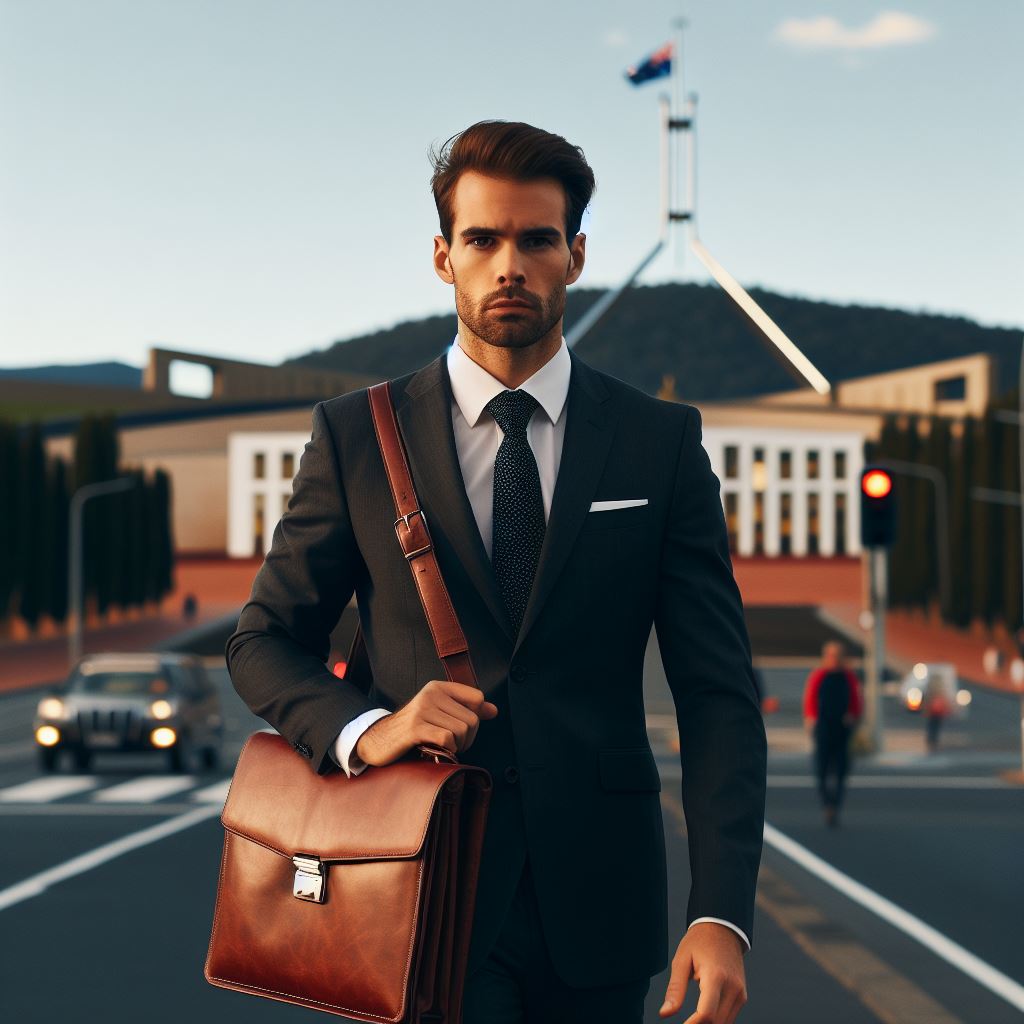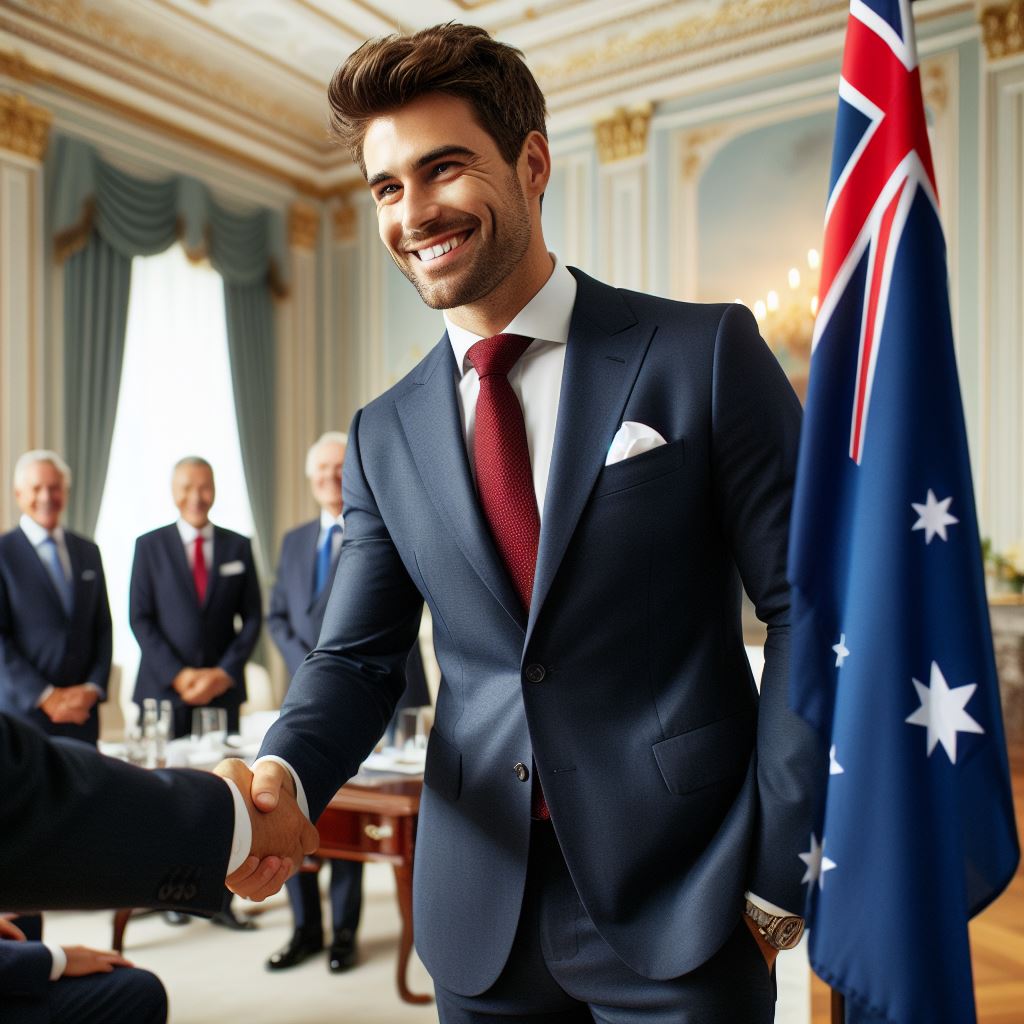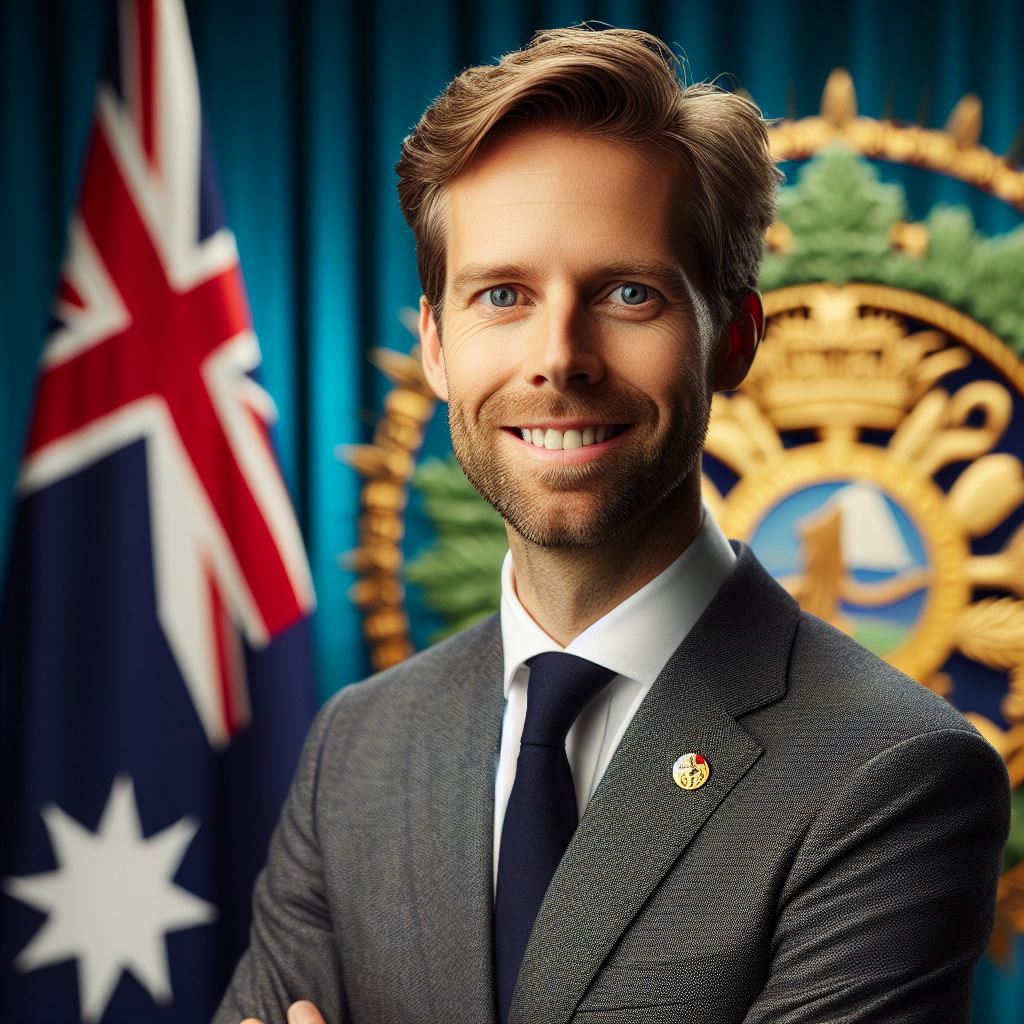Introduction
A diplomat is an official representing a government in negotiations and maintaining relations with other countries.
Diplomats play a crucial role in representing their country abroad, ensuring the promotion of national interests and international cooperation.
Australian diplomats, in particular, hold significant responsibility in advancing Australia’s foreign policies and safeguarding its interests across the globe.
This blog post aims to provide insights into the daily life of an Aussie diplomat, shedding light on their roles and responsibilities, challenges, and accomplishments.
By understanding the unique experiences and demands of an Australian diplomat, readers can gain a deeper appreciation for the vital work they do.
Australian diplomats are entrusted with various tasks, such as fostering diplomatic relations, promoting trade and investment, providing consular assistance to Australians abroad, and advocating for Australian interests internationally.
They navigate complex political landscapes, engage in dialogue between governments, and participate in international forums.
Their work involves building connections, negotiating agreements, and representing Australia’s views on a wide range of issues, including climate change, human rights, security, and trade.
On a typical day, an Aussie diplomat may find themselves attending high-level meetings with foreign dignitaries, drafting diplomatic cables, analyzing political developments, and conducting research to inform Australia’s foreign policy decision-making.
They may also connect with Australian citizens residing or visiting their host country, addressing their concerns and providing support in times of crisis.
Furthermore, Australian diplomats are often involved in cultural exchange programs, promoting Australian education, arts, and culture.
The daily life of an Aussie diplomat can be demanding, requiring adaptability, networking skills, and an understanding of different cultures.
It is a rewarding career that allows individuals to make a tangible impact on Australia’s international standing and contribute to global affairs.
Stay tuned to discover more about the experiences and challenges faced by Australian diplomats in upcoming sections of this blog.
Overview of the Australian Diplomatic Service
Brief History and Background of Australian Diplomats
Australian diplomats have a long history dating back to the early establishment of the Australian colonies. The first Australian diplomatic mission was set up in London in 1918, shortly after the end of World War I.
Since then, Australia has expanded its diplomatic presence across the globe.
Over the years, Australian diplomats have played a crucial role in representing the country’s interests and promoting international cooperation. They have been key players in negotiations, peacekeeping missions, and trade agreements.
Importance of Diplomacy in Australia’s Foreign Relations
Diplomacy is vital for Australia’s foreign relations as it enables the country to engage with other nations, build partnerships, and resolve conflicts diplomatically.
Australian diplomats act as the primary interface between the Australian government and foreign governments.
Australia’s diplomatic efforts focus on advancing its national interests, including enhancing economic cooperation, promoting human rights, and contributing to global security and stability.
Overview of the Department of Foreign Affairs and Trade (DFAT)
The Department of Foreign Affairs and Trade (DFAT) is the Australian government agency responsible for managing the country’s international relations. It plays a central role in promoting Australia’s national interests and values.
DFAT’s main objective is to advance Australia’s security, prosperity, and influence internationally. It oversees a vast network of diplomatic missions, consulates, and trade offices worldwide.
Key Responsibilities and Functions of Aussie Diplomats
Australian diplomats have a wide range of responsibilities and functions. They represent Australia’s interests abroad, facilitate trade and investment, protect Australian citizens, and promote cultural and people-to-people connections.
They engage in political and economic analysis, provide advice to the Australian government, and negotiate agreements on various issues, such as trade, defense, and climate change.
Aussie diplomats also work on consular and passport services, helping Australians overseas during emergencies, providing consular assistance, and issuing passports.
Furthermore, they engage in public diplomacy, promoting Australia’s image, culture, and values through public events, speeches, and media engagements. They contribute to shaping international public opinion about Australia.
In review, Australian diplomats play a vital role in representing Australia’s interests and values on the global stage.
They are responsible for engaging with foreign governments, promoting international cooperation, and advancing Australia’s national interests.
Through their diplomatic efforts, they contribute to fostering peace, prosperity, and goodwill between Australia and the rest of the world.
Read: How Technology Aids Aussie Firefighters
Education and Qualifications
- Aspiring diplomats must have a required educational background to fulfill their dreams.
- Language skills and cultural awareness are of utmost importance for diplomats to effectively navigate foreign environments.
- There are numerous opportunities for diplomats to undergo further specialized training in areas like negotiation and conflict resolution.
- Having a diverse educational background provides diplomats with a unique advantage in the field of diplomacy.
Education plays a crucial role in shaping the qualifications of aspiring diplomats. To embark on a successful diplomatic career, individuals must possess a specific educational background.
Most countries require a bachelor’s degree as a minimum requirement to become a diplomat. Fields of study can vary, but subjects such as international relations, political science, economics, or law are often preferred.
Importance of language skills and cultural awareness
Moreover, language skills and cultural awareness are essential for diplomats to fulfill their responsibilities effectively.
Diplomats function as representatives of their countries and must be able to effectively communicate with foreign counterparts.
Proficiency in multiple languages is highly advantageous as it enables diplomats to establish connections, understand diverse cultures, and bridge potential communication gaps.
In addition to language skills, diplomats can also benefit from having a deep understanding of cultural nuances.
Cultural awareness allows diplomats to navigate unfamiliar territories, anticipate potential challenges, and demonstrate respect for local customs.
This knowledge plays a crucial role in building trust and fostering productive relationships with foreign governments, organizations, and individuals.
As the field of diplomacy continues to evolve, there are ample opportunities for diplomats to undergo further training.
Specialized programs and workshops provide diplomats with valuable skills in areas such as negotiation, conflict resolution, and diplomatic protocol.
These trainings enhance their ability to handle complex diplomatic situations and overcome challenges effectively.
Your Personalized Career Strategy
Unlock your potential with tailored career consulting. Get clear, actionable steps designed for your success. Start now!
Get StartedAdvantages of a diverse educational background in diplomacy
Furthermore, a diverse educational background can offer distinct advantages in the field of diplomacy.
Diplomats often encounter a wide range of issues, from political crises to economic negotiations.
Having a diverse educational background equips diplomats with a broader perspective, enabling them to tackle complex problems from various angles.
For example, a diplomat with a background in economics may bring unique insights to negotiations involving trade agreements.
The ability to approach diplomacy from different disciplinary perspectives can lead to more innovative and creative solutions.
Drawing from various fields of study, diplomats can apply diverse knowledge and experiences, making them well-rounded professionals in their field.
In summary, education and qualifications play a crucial role in the life of an Aussie diplomat.
Aspiring diplomats must possess a required educational background, while language skills and cultural awareness are of utmost importance.
Opportunities for further specialized training are also available to enhance diplomats’ skills.
Lastly, a diverse educational background provides invaluable advantages to diplomats, enabling them to approach diplomacy from various perspectives and tackle complex issues effectively.
Read: The Future of Firefighting in Australia

Morning Routine
Start of the day: As an Aussie diplomat, my morning begins with my arrival at the embassy or consulate.
I quickly get settled in my office and start reviewing and responding to the numerous emails, memos, and updates that have come in overnight.
Preparation for diplomatic meetings and events is a crucial part of my morning routine. I go through the agenda, gather necessary documents, and make sure everything is in order.
Coordinating with fellow diplomats and staff is another important task. We discuss the day’s schedule, delegate responsibilities, and ensure smooth operations.
Regular briefings with superiors are also a part of my morning routine. I stay updated on the latest developments, receive instructions, and seek guidance as needed.
As an Australian diplomat, each day brings its own set of challenges and opportunities. With my morning routine complete, I am ready to take on the day’s diplomatic activities.
Read: Firefighting Gear: What Do They Really Wear?
Diplomatic Meetings and Negotiations
Diplomatic meetings and negotiations are essential aspects of an Aussie diplomat’s life.
These interactions play a crucial role in representing Australia’s interests on a global scale.
In this section, we will delve into the different types of meetings and negotiations diplomats engage in, their significance, and the challenges they face.
Diplomats participate in various types of meetings, from informal gatherings to high-level discussions.
These meetings can occur at embassies, international conferences, or even through virtual platforms.
Each meeting serves a specific purpose, such as exchanging information, addressing specific issues, or building diplomatic relationships.
By attending these meetings, diplomats ensure Australia’s concerns and viewpoints are heard and taken into account.
Negotiations, on the other hand, involve discussions aimed at reaching agreements or resolving conflicts between different parties.
Diplomats employ their skills in negotiation to protect Australia’s national interests and secure favorable outcomes.
Negotiations can cover a wide range of topics, including trade agreements, disarmament, climate change, or human rights.
Role of diplomats in representing Australia’s interests
To understand the role of diplomats in representing Australia’s interests, let’s take a closer look at some examples.
For instance, a diplomat might engage in discussions with foreign counterparts to promote Australia’s economic interests by securing favorable trade deals.
Another example could be treaty negotiations on climate change, where diplomats work tirelessly to ensure Australia’s contribution aligns with national priorities and commitments.
Challenges faced during negotiations and how to overcome them
Engaging in diplomatic negotiations is not without challenges.
Diplomats often face differences in cultural norms, values, and language barriers.
These hurdles can hinder effective communication and understanding, making it necessary for diplomats to develop cultural sensitivity and adaptability skills.
Overcoming these challenges requires patience, empathy, and a genuine willingness to find common ground.
Effective communication and persuasion skills are essential tools in diplomatic negotiations.
Diplomats must articulate Australia’s perspectives clearly and convincingly to promote their country’s interests.
By employing active listening and empathy, diplomats can build trust and foster productive dialogues.
Additionally, the ability to find common ground, propose innovative solutions, and work collaboratively with other nations is crucial in reaching successful agreements.
Negotiations involve compromise, and diplomats must navigate through complex political landscapes to find mutually beneficial outcomes.
They must have a deep understanding of Australia’s national priorities and be able to balance these with the interests of other nations.
Flexibility, creativity, and strategic thinking are crucial for diplomats to overcome roadblocks and achieve positive results.
In general, diplomatic meetings and negotiations form the backbone of an Aussie diplomat’s work.
These interactions allow diplomats to represent Australia’s interests, participate in crucial discussions, and reach agreements on various global issues.
Challenges faced during negotiations can be overcome through effective communication, cultural sensitivity, and a commitment to finding common ground.
Diplomats play a vital role in shaping Australia’s international relations, ensuring a prosperous and secure future for the nation.
Read: Fire Service Ranks in Australia Explained
Cultural Activities and Public Diplomacy
As an Aussie diplomat, one of the most important parts of my job is engaging in various cultural activities and promoting public diplomacy.
This involves attending cultural events, hosting embassy functions, and facilitating people-to-people exchanges.
Stand Out with a Resume That Gets Results
Your career is worth more than a generic template. Let us craft a resume and cover letter that showcase your unique strengths and help you secure that dream job.
Get HiredAttending Cultural Events and Hosting Embassy Functions
Attending cultural events is an essential part of my role as a diplomat. It allows me to immerse myself in the local culture, connect with the host country’s community, and build relationships with influential figures.
From art exhibitions to music festivals and theater performances, I make it a point to attend as many events as possible.
Additionally, hosting embassy functions provides an excellent opportunity to showcase Australian culture and values.
Whether it’s organizing a reception, a film screening, or a cultural night, these events help in fostering goodwill and strengthening diplomatic ties between Australia and the host country.
Promoting Australian Culture and Values Abroad
One of the primary goals of public diplomacy is to promote Australian culture and values abroad. I actively engage with local communities and organizations to create a platform for dialogue and cultural exchange.
By organizing workshops, lectures, and panel discussions, I aim to increase understanding and appreciation for Australian traditions, diversity, and way of life.
Engaging with Local Communities and Organizations
Building relationships with local communities and organizations is crucial for effective public diplomacy. I participate in community outreach programs, collaborate with local NGOs, and establish partnerships with educational institutions.
These interactions enable me to gain insights into the host country’s culture, customs, and societal issues, which further enriches my diplomatic work.
Facilitating People-to-People Exchanges and Fostering Cultural Understanding
People-to-people exchanges play a significant role in fostering cultural understanding and diplomatic relations. I facilitate exchange programs, cultural tours, and internships to promote interaction between Australian citizens and the local population.
This helps in bridging cultural gaps, building trust, and creating long-lasting connections between both nations.
Showcasing Australian Products, Arts, and Entertainment
Another aspect of public diplomacy is showcasing Australian products, arts, and entertainment. I collaborate with local businesses, artists, and performers to organize Australian-themed exhibitions, concerts, and film screenings.
Through these initiatives, I not only promote Australian talent but also attract attention towards Australian industries and products in the global market.
In a nutshell, my role as an Aussie diplomat extends beyond traditional diplomacy. Engaging in cultural activities and promoting public diplomacy allows me to strengthen ties, foster cultural understanding, and showcase the best of Australia to the world.
It’s an exciting and rewarding part of my job that greatly contributes to enhancing Australia’s global presence.
Lunch Break and Networking
In diplomatic circles, networking plays a crucial role in building relationships and fostering international cooperation.
It provides diplomats with the opportunity for personal and professional development, as well as creating avenues for effective communication and negotiation.
Importance of Networking in Diplomatic Circles
- Networking is essential for diplomats to establish connections with foreign diplomats, government officials, or business representatives.
- These connections can help in creating diplomatic ties, sharing information, and collaborating on global issues.
- Networking allows diplomats to stay informed about developments in different countries and regions, aiding their understanding of diverse perspectives.
- It also provides an opportunity for diplomats to exchange ideas, explore potential partnerships, and promote their country’s interests.
Lunch Meetings with Foreign Diplomats, Government Officials, or Business Representatives
- Lunch meetings are a common way to engage in formal or informal discussions and establish rapport with international counterparts.
- These meetings provide a relaxed setting in which diplomats can discuss matters of mutual interest.
- Diplomats can use lunch meetings to promote their country’s political, economic, or cultural agenda.
- Additionally, lunch meetings can lead to the initiation of joint projects, collaborations, or agreements.
Building Relationships and Fostering Cooperation
- Networking during lunch breaks allows diplomats to build personal relationships based on trust and understanding.
- Strong relationships can enhance cooperation on various diplomatic issues, including trade, security, and cultural exchanges.
- By fostering communication and collaboration, diplomats can work towards resolving conflicts and promoting peace.
- Building positive relationships can also facilitate crisis management and effective negotiation during difficult situations.
Opportunities for Personal and Professional Development through Networking
- Active networking opens doors for diplomats to expand their knowledge, skills, and expertise.
- By connecting with professionals from different fields, diplomats can gain insights into new perspectives and innovative approaches.
- Networking events provide opportunities to attend seminars, workshops, and conferences, enhancing diplomats’ professional growth.
- Engaging in meaningful conversations during lunch breaks helps diplomats develop their communication and negotiation skills.
Strategies for Effective Networking in a Diplomatic Setting
- Approach networking with a genuine interest in getting to know others and building mutually beneficial relationships.
- Be an active listener, showing respect for others’ opinions and perspectives.
- Seek opportunities to contribute to discussions and offer assistance or support to fellow diplomats.
- Attend networking events, conferences, and cultural gatherings to expand your circle and establish new contacts.
- Utilize digital platforms and social media to maintain connections and stay updated on relevant diplomatic trends.
In essence, lunch breaks provide diplomats with valuable opportunities for networking, enabling them to establish connections, build relationships, and foster international cooperation.
Engaging in lunch meetings with foreign diplomats, government officials, or business representatives can lead to personal and professional development.
By utilizing effective networking strategies, diplomats can make the most of these interactions and contribute to their country’s diplomatic endeavors.
Afternoon Tasks and Administrative Duties
During the afternoon, an Aussie diplomat is busy with a variety of administrative tasks, paperwork, and reporting. These tasks are essential in ensuring the smooth operation of the embassy and maintaining effective diplomatic relations.
Administrative Tasks, Paperwork, and Reporting
One of the primary responsibilities of a diplomat is to handle administrative tasks efficiently. This includes managing correspondence, organizing files, and scheduling meetings.
The diplomat carefully reviews incoming paperwork, ensuring that it is properly filed and distributed to the relevant embassy staff. They make sure that all administrative processes are streamlined and adhere to embassy guidelines.
As part of their reporting duties, the diplomat prepares regular reports on the embassy’s activities and submits them to the Department of Foreign Affairs and Trade (DFAT) back in Australia.
These reports provide an overview of the current political, social, and economic landscape of the host country.
Research and Analysis on the Host Country’s Political, Social, and Economic Landscape
An Aussie diplomat is well-versed in the political, social, and economic dynamics of the host country. They conduct extensive research and analysis to gain a deeper understanding of the local context.
Transform Your LinkedIn for Maximum Impact
Elevate your professional brand with a LinkedIn profile that attracts recruiters, showcases your expertise, and maximizes opportunities. Stand out in your industry with a profile built for success.
Boost ProfileThis involves studying the host country’s political system, major political parties, key government officials, and any recent developments or changes. The diplomat keeps a keen eye on social trends, cultural nuances, and economic indicators.
By maintaining a constant awareness of the local landscape, the diplomat can effectively represent Australia’s interests and tailor diplomatic initiatives accordingly.
Drafting Diplomatic Letters, Reports, and Official Documents
A significant part of an Aussie diplomat’s afternoon involves drafting various diplomatic letters, reports, and official documents.
These documents may include formal letters to government officials, diplomatic notes, and reports on bilateral meetings or negotiations. It is crucial that they are drafted accurately, concisely, and in a diplomatic tone.
Additionally, the diplomat may be involved in preparing official documents such as agreements, memorandums of understanding, or diplomatic treaties.
Precise drafting and meticulous attention to detail are essential to ensure the accuracy and completeness of these documents.
Regular Coordination with DFAT and Other Government Departments
The Australian embassy works closely with the Department of Foreign Affairs and Trade (DFAT) and other government departments back in Australia.
The diplomat maintains regular coordination with DFAT, providing updates on the embassy’s activities and seeking guidance or instructions when necessary. This coordination ensures that the embassy’s work aligns with Australia’s foreign policy objectives.
The diplomat may also liaise with other government departments that have a stake in the embassy’s work. This collaboration ensures a cohesive and integrated approach in pursuing Australia’s interests abroad.
Updating and Maintaining Embassy Records and Databases
Accurate and up-to-date records are crucial for any diplomatic mission. An Aussie diplomat dedicates time to updating and maintaining embassy records and databases.
This involves managing databases that contain information on key contacts, local organizations, and government officials. The diplomat ensures that these databases are regularly updated to facilitate efficient communication and coordination.
Moreover, the diplomat may contribute to the embassy’s knowledge management system, organizing and categorizing important documents and information for easy retrieval and reference.
At the end of the day, an Aussie diplomat’s afternoon tasks and administrative duties contribute to the effective functioning of the embassy and the advancement of Australia’s foreign policy goals.
End of the Day and Personal Time
- At the end of the day, I wrap up ongoing tasks and make sure to finalize reports.
- I then have a debriefing session with my colleagues and superiors to discuss our progress.
- After a long day of work, it’s crucial for me to have personal time for relaxation, exercise, or leisure activities.
- As a diplomat, balancing work and personal life is essential for my overall well-being and productivity.
- I prioritize self-care and stress management to maintain a healthy mindset and perform my duties effectively.
Explore Further: Day in the Life of a Gov Policy Analyst in AU
Conclusion
In the intricate tapestry of international relations, an Aussie diplomat’s daily routine is a dynamic interplay of responsibilities and challenges, where every action resonates with the pursuit of Australia’s national interests.
From engaging in high-stakes negotiations to fostering cultural exchanges, diplomats navigate a diverse landscape with adaptability and tact.
Recapping their routine unveils a mosaic of responsibilities: crafting and implementing foreign policies, representing Australia abroad, and participating in diplomatic missions.
The challenges they encounter, from navigating political complexities to fostering cross-cultural understanding, underscore the demanding nature of diplomatic work.
Yet, amidst these challenges lies a tapestry of rewards—forging international collaborations, contributing to global peace, and safeguarding Australia’s interests on the world stage.
Diplomacy, as illuminated through the lens of an Aussie diplomat’s role, emerges as a linchpin in advancing Australia’s national interests.
It is not merely a series of negotiations but a strategic dance that shapes the nation’s narrative on the global stage.
The importance of diplomacy in fostering alliances, addressing global challenges, and promoting Australia’s values cannot be overstated.
For those drawn to the world of diplomacy, this exploration serves as an encouragement.
A diplomatic career promises not only challenges but also the fulfillment of contributing to a nation’s global standing.
It beckons individuals to embark on a journey where every negotiation, every cultural exchange, becomes a brushstroke in the canvas of Australia’s diplomatic legacy.
Within the Australian diplomatic service, numerous career paths unfold—political, trade, and public diplomacy, to name a few.
Each avenue offers a unique trajectory for those with a passion for international relations.
As we conclude, the world of diplomacy invites aspiring minds to step into its realm, where the pursuit of Australia’s national interests unfolds as a compelling and rewarding journey.




